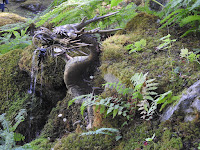I've just finished reading "Babel" by R.F. Kuang. The writing was good, although I had to overlook 1883 era characters using the words "morph" and "ridiculous"—two of my pet peeve words—anachronistically.
I went in thinking the novel would be a high fantasy about a magical library, and in a sense Babel is, but the novel is more an alternative magical history meditation on (the British) Empire and colonialism, capitalism, and on the relationships of academia and the military-industrial complex. As someone who has worked for a university for twenty-some years, some of the book's observations about exploitive worker-producer-product relations in the institution of higher education hit close to home.
The novel ends on a grim but open-ended note, sort of like the end of "The Empire Strikes Back," only without a Rebel Alliance. I will shelve "Babel" with books like "1984," "The Handmaid's Tale," "Animal Farm," and other cultural critique books that are, to paraphrase Anna Russell, "art that one must expose oneself to without thought of reward or enjoyment."

No comments:
Post a Comment